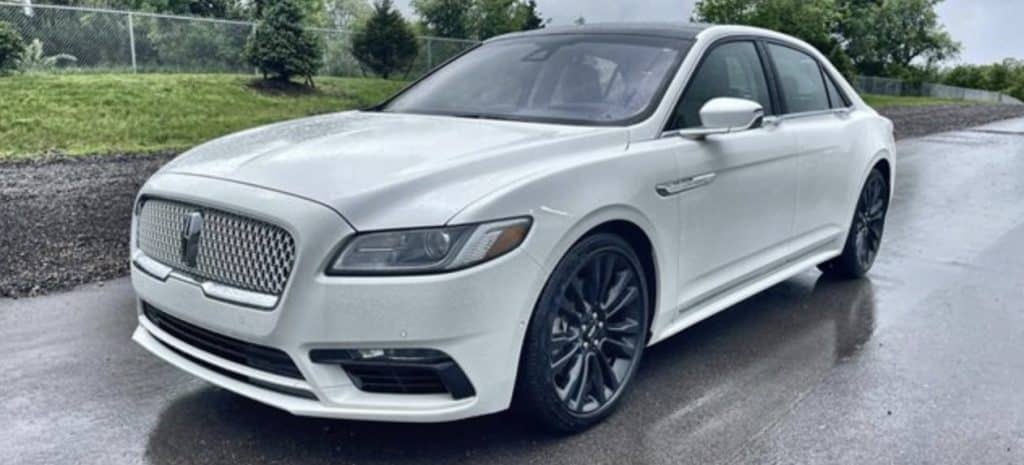
Experiencing an engine rattle in your Lincoln Continental can be quite concerning, but fear not! This is a common issue faced by many Continental owners, and understanding the possible causes can have you on your way to a smooth-running engine in no time.
In this article, we’ll explore the most common reasons a Lincoln Continental engine may rattle and what you can do about it.
Several factors can lead to a rattling sound coming from the engine, ranging from exhaust issues to loose accessories or even timing chain problems.
As you read on, you’ll discover detailed explanations of the common causes of engine rattling in Lincoln Continentals, as well as some helpful tips for diagnosing and fixing the issue yourself.
Keep in mind that some situations might require a professional mechanic’s expertise, but it’s always useful to have a better understanding of what’s going on underneath the hood.
Lincoln Continental Engine Rattle Common Causes
Heat Shield Issues
Rattling noise should sound like it’s coming from under the engine.
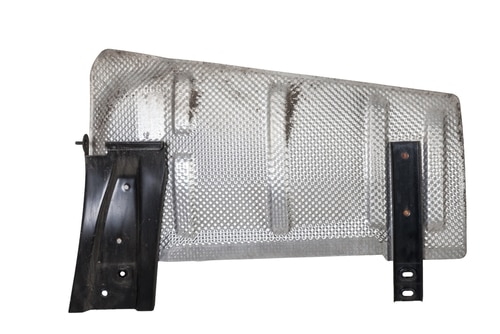
Loose Heat Shield
One common cause of engine rattling in your Lincoln Continental is a loose heat shield. Over time, as your vehicle ages and accumulates mileage, the heat shield can become loose.
When this happens, you’ll likely notice a rattling noise coming from the exhaust area, particularly when revving the engine in neutral and releasing the gas pedal.
Repairablility is going to depend on whether or not the heat shield was welded or bolted into place.
Rust and Damage
Another issue that may contribute to a rattling heat shield is rust and damage. If the heat shield has sustained damage or has begun to rust, it may lose its structural integrity, leading to an increased likelihood of rattling and potentially posing a hazard to your car.
Whether it’s loose or damaged, inspecting the heat shield is a no brainer if the rattling sound sounds like it’s coming from a low spot.
Timing Chain and Tensioner Problems
The sound should come from the front of the engine, it’s usually most noticable at start up and low RPM’s.
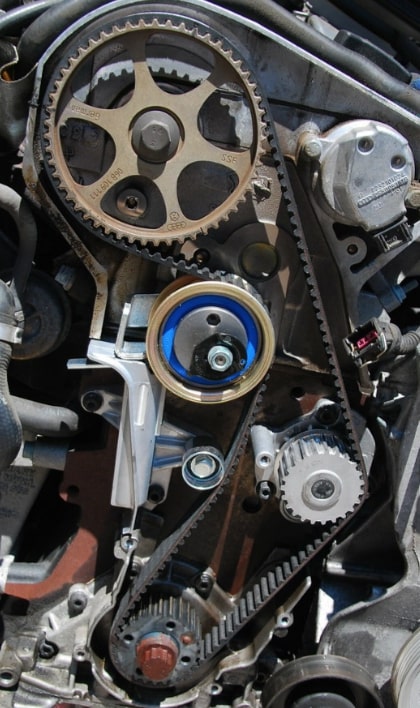
As a Lincoln Continental owner, you might experience engine rattle issues caused by two primary factors: the timing chain and the tensioner. Let’s explore these problems in detail.
Timing Chain Issue
In some cases, the timing chain on your Lincoln Continental could become stretched, which can lead to a loud rattling noise coming from your engine. This stretching can be a result of regular wear and tear or inadequate maintenance. A stretched timing chain can cause the following:
- Poor engine performance
- A decrease in fuel efficiency
- Engine misfiring
- Difficulty starting your vehicle or a no start condition
It’s essential to address this issue as soon as possible to prevent further damage to your engine. Make sure you have your timing chain inspected and replaced if necessary.
Timing Chain Tensioner Fault
Another common issue that can lead to engine rattle in your Lincoln Continental is a faulty timing chain tensioner. The tensioner’s primary function is to maintain proper tension on the timing chain, ensuring smooth and accurate engine timing. When the tensioner fails, it can cause the following problems:
- Loud rattling or slapping noise coming from your engine
- Erratic engine performance
- Potential damage to other components, such as the timing chain guides
Whether you suspect the timing chain or the timing chain sensor, they should BOTH be replaced at the same time.
Valve and Piston Issues
Sound comes from the top of your Continental’s engine for valve lash. Both sounds are a tapping noise.
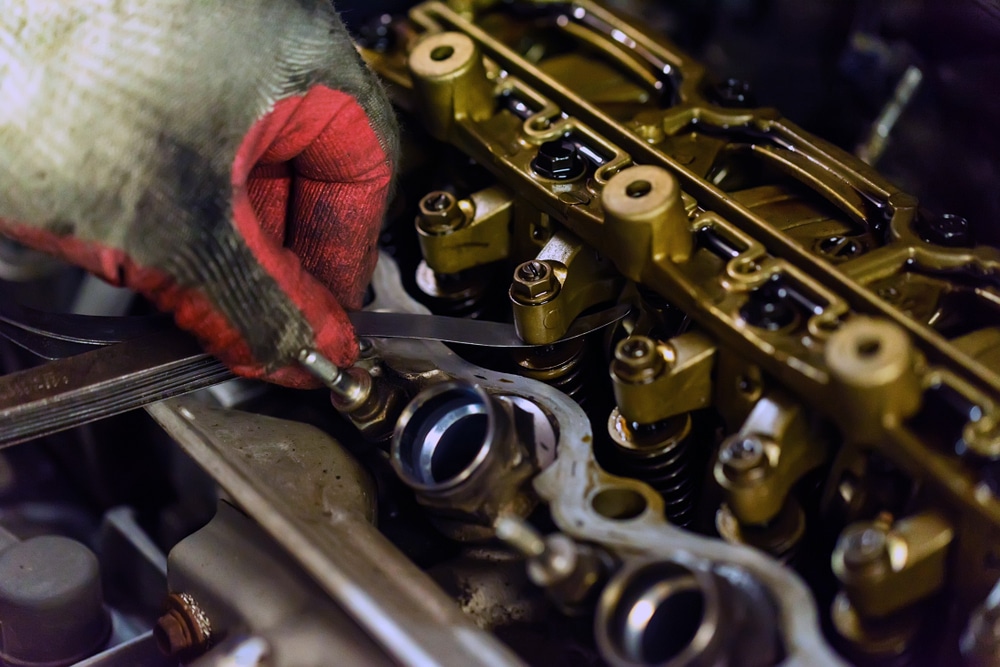
Valve Lash Adjustment
Note: Most modern vehicles use self adjusting valves. Verify your Continental’s model year and engine type needs manual valve lash adjustments before reading this section.
One possible cause of a rattling noise in your Lincoln Continental’s engine is the valves. Over time, the clearance between the valves and their corresponding parts may become too tight or too loose, leading to a ticking or rattling noise, especially at idle.
Here’s a quick guide on adjusting your valves:
- Park and cool down: Park your Continental in a safe and level area, and let the engine cool completely.
- Remove components: Carefully remove any components blocking access to the valve cover, such as the air-intake assembly and hoses.
- Take off the valve cover: Loosen and remove the bolts holding the valve cover in place, then lift off the cover.
- Find top dead center: Rotate the engine’s crankshaft until the number one piston is at the top dead center (TDC) of its compression stroke.
- Check clearances: Using a feeler gauge, measure the clearance between the valve rocker arms and corresponding components (e.g., camshaft tappets).
- Adjust as needed: If the clearance is outside the manufacturer’s specifications, loosen or tighten the adjustable section of the rocker arm accordingly.
Remember, it’s crucial to consult your vehicle’s service manual for the correct valve clearances and specific adjustment procedures.
Piston Slap
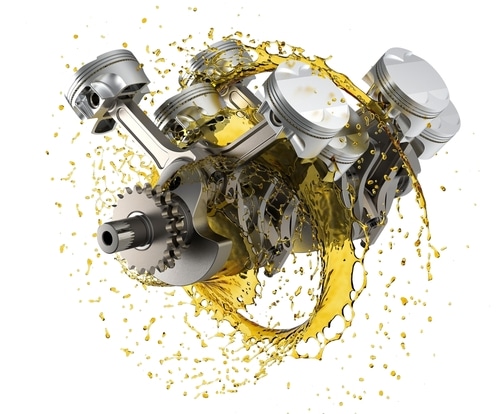
Another potential cause of a rattling engine noise in your Lincoln Continental is piston slap.
Piston slap typically occurs as a result of wear on the piston and the cylinder walls, causing the piston to move side-to-side and making contact with the cylinder wall.
Piston slap is more commonly seen in vehicles with higher mileage.
If you suspect piston slap is causing the rattling noise, it’s essential to diagnose and address the issue promptly to prevent further damage to your engine. Here are a couple of possible solutions:
- Engine oil change: Ensuring your Continental has the proper type of engine oil and the right level can help reduce piston slap by providing better lubrication between the piston and the cylinder walls.
- Engine rebuilding: In more severe cases, it may be necessary to rebuild the engine and replace the worn components, such as the pistons, piston rings, and cylinder walls.
Exhaust Leak
An exhaust leak around the exhaust manifold can sound just like an engine rattle.
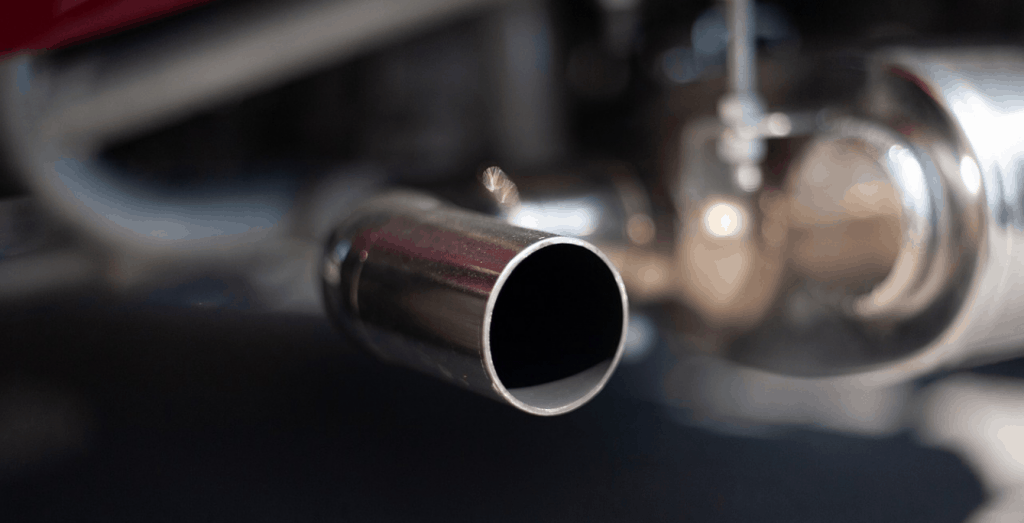
As a Lincoln Continental owner, you might come across engine rattles caused by exhaust leaks and issues with the catalytic converter.
It’s essential to handle these concerns effectively to maintain your vehicle’s performance and emissions.
An exhaust leak can contribute to the metallic rattling sound you may hear when driving your Continental.
A common sign of an exhaust leak is a louder engine sound than usual due to the reduced effectiveness of the muffler.
Water Pump Problems
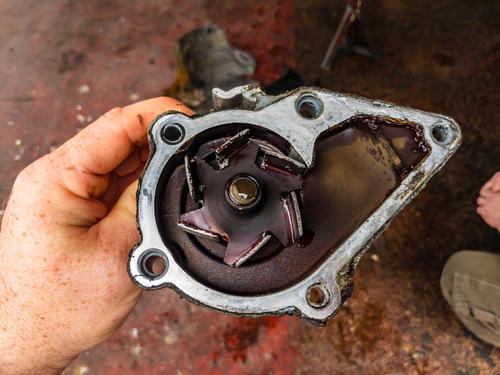
Another potential issue leading to engine rattle in your Lincoln Continental might be related to the water pump.
The water pump is responsible for circulating coolant through the engine, preventing it from overheating.
A malfunctioning water pump can cause an array of issues, including overheating, decreased cooling efficiency, and, in some cases, a rattle or vibration within the engine compartment.
Diagnosis and Repair

Identifying the Problem
You can use your ears to identify the problem. If you are having a hard time pinpointing the exact location, get a mechanics stethoscope.
Consulting a Mechanic
If you’re unsure about the cause or want a professional opinion, consult a trusted mechanic.
DIY Repair Solutions
For those who feel comfortable tackling repairs themselves, some DIY solutions may help address the engine rattle issue in your Lincoln Continental. For example:
- Timing Chain Tensioner Replacement: A worn or loose timing chain tensioner may be the culprit behind the rattle sound. In this case, replacing it can remedy the noise.
- Loose Accessories: Examine the belts, pulleys, and accessories connected to your engine. If any of these parts are loose, tightening them may stop the rattling sound.
- Exhaust Repair: Sometimes, a rattling engine noise may be due to an issue with the exhaust system, such as a loose heat shield. Inspect the exhaust system and repair or replace any damaged components as needed.
Keep in mind that while DIY repairs can save you money, they may also void warranties or lead to potential damage if not performed correctly.
Always consult your vehicle’s owner’s manual and exercise caution when attempting any repairs on your own.
Preventative Measures
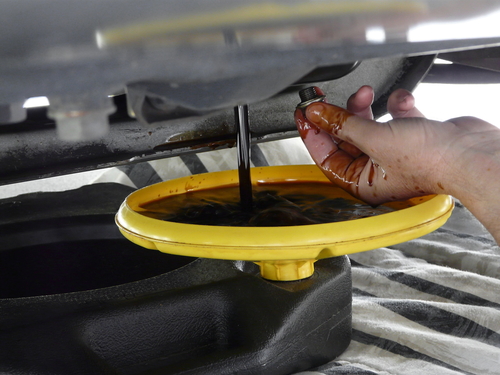
Taking preventative measures to avoid engine rattle is essential for ensuring your Lincoln Continental’s longevity and performance. Here are some tips that may help you maintain your truck’s engine and prevent rattling issues:
- Regular oil changes: Stay on top of your truck’s oil change schedule. Regular oil changes keep your engine properly lubricated and help prevent excessive wear on internal components, some of which could lead to rattling noises if not maintained. Change your Continental’s oil when the oil minder says or consult your Lincoln owners manual.
- Monitor oil pressure: Keep an eye on your Continental’s oil pressure gauge to ensure it’s within the normal range. Low oil pressure can contribute to engine rattling by allowing components to rub together, leading to premature wear and even engine damage in severe cases. If you notice any sudden drops in oil pressure, consult a professional mechanic to diagnose and resolve the issue.
- Use quality oil and filters: Choose high-quality oil and oil filters designed for your Continental’s engine, as these products can have a significant impact on overall engine performance and longevity. Higher quality oils will provide better protection against wear and potential rattling issues.
- Check for loose or worn parts: Periodically, inspect your Continental’s engine for any loose or worn components, such as belts, accessories, or heat shields. These parts can vibrate and cause rattling noises if not secured or replaced. Tightening or replacing worn components can help eliminate potential sources of engine rattle.
- Address any rattling issues promptly: If you begin to notice any rattling or ticking sounds from your Continental’s engine, don’t ignore them. Schedule an appointment with a qualified mechanic to diagnose and resolve the issue, as taking care of it promptly can help prevent further damage and more costly repairs.
Conclusion
To find the reason why your Lincoln Continental’s engine is rattling, use your ears and maybe a mechanics stethoscope to pinpoint the location of the noise. Good luck repairing your car!

